

Welcome to the second part of my series where I review the lesser known albums from the old American death metal scene. It was by sheer coincidence that nearly all the bands discussed in this issue place a strong emphasis on groove. First up is Morpheus Descends, who took the Floridian formula and infused it with New York style brutality. Next up is Baphomet, another cult classic band from New York, and after that is their brief name change to Banished. Following them up is Tyrant Trooper, a Connecticut band that offered up simple yet pulverizing songs. Finally, we have Gutted, who play a heavier and groovier rendition of Obituary's formula.
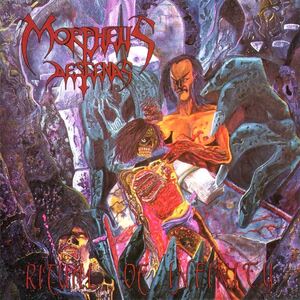
Morpheus Descends - Ritual of Infinity
Morpheus Descends is one of the most prominent names in the New York death metal underground. The band formed in Middletown in 1990. They were originally known simply as Morpheus, but they added Descends at the end to make themselves stand out more. Shortly thereafter, they released their full-length debut Ritual of Infinity through JL America. It was re-released by Dark Descent Records thirty years later.
The production has that perfect blend of clarity and heaviness. The music itself combines elements from Death, Obituary, Morbid Angel, and New York hardcore. One of the highlights on here is the bass work of Ken Faggio. (Spare the jokes.) Not only can he be heard really well, but he also plays a lot of riffs that range from groovy to technical. The best display of his skills can be found on "Sumberged in Adipocere." Drummer Sam Inzerra offers up a diverse collection of patterns ranging from slow, stomping beats to skank beats to simple blast beats to more intricate passages that are always punctuated by excellent fills.
Vocalist Jeff Reimer belts out a grisly growl that sounds deeper than what most others were doing around the same time. Guitarists Steven Hanson and Rob Yench are the ones who make the music truly dark. The many tremolo riffs they play make the music sound like it came from an infernal abyss. Some of their chord progressions sound quite technical for their time, and they also throw in some doom riffs that sound like a more foreboding version of Black Sabbath. The solos are great, but most interesting of all are the chugging riffs that sound quite similar to the many slam riffs of today. Those listening to this album back in the day must have been amazed at how heavy those riffs were. If there are brutal death metal bands out there that were directly influenced by this album, I would not be surprised.
Ritual of Infinity was way ahead of its time. It featured a lot of compelling ideas that were fleshed out by later bands. Not only is it innovative, it's also a joy to listen to.
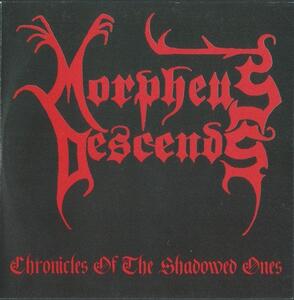
Morpheus Descends - Chronicles of the Shadowed Ones
Two years after Ritual of Infinity, Morpheus Descends released an EP called Chronicles of the Shadowed Ones, which drastically improves upon the unique formula they crafted. The production is richer and more atmospheric, which makes the music sound even more infernal. Bassist Ken Faggio was replaced by former Subconscious member Andy Newton. He does a great job, filling every song with intricate and menacing riffs. Drummer Sam Inzerra continues to put on an excellent performance. His slow beats are bone-crushing, his mid-paced patterns are pulverizing, and his blast beats are ravenous.
Jeff Reimer's growls have gotten slightly deeper since last time, perfectly matching the darker nature of the music. Robert Yench is still part of the lineup, but Steve Hanson was replaced by another former Subconscious member named Bryan Johnston. Many of the riffs they play here are slightly more polished and detailed versions of what was present on Ritual of Infinity, but most impressive of all are the many chugging riffs that sound very similar to brutal death metal while also containing some elements of doom metal. They are heavy, menacing, and unique.
This EP was a fantastic blend of great songwriting, instrumental work, and atmosphere. The band released another EP three years later called The Horror of the Truth, but it wasn't as good. They're still around too, but they haven't released any new material since 2015.
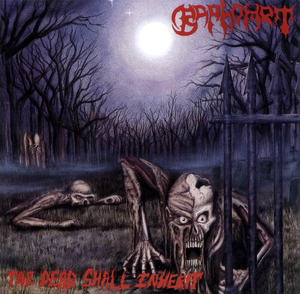
Baphomet - The Dead Shall Inherit
Baphomet hail from Buffalo, New York, the same city that birthed Cannibal Corpse and Malevolent Creation. They formed in 1987 and originally played extreme thrash metal, but they gradually transformed into a true death metal act. Their 1992 full-length, The Dead Shall Inherit, is a cult classic, and for good reason.
The production has that classic rich and full quality. Rick Breier does a fantastic job behind the drum kit. His mid-paced patterns are precise and often feature lots of thumping double bass. His blast beats are strong and aggressive. I was most impressed by his many fills, which are quite elaborate in their design. Bassist Gary Schipani does some outstanding work here. He can be heard very well and his riffs are heavy and complex, most notably on songs like "Valley of the Dead."
Frontman Tom Frost does a low demon growl similar to Glen Benton. It sounds excellent and reinforces the malevolent nature of the rest of the music. Dave Craiglow proves himself to be an amazing guitarist. His performance sounds like a blend of Deicide and Cannibal Corpse. He mainly plays chugging riffs, which sound great, but he also plays fiery palm-muted riffs and chord progressions that are sometimes mid-paced and groovy and other times slow and doom-like. Like other death metal bands that emerged from New York around that time, these guys completely ignore solos in favor of blunt brutality. All of the riffs are simple for the most part, but they're thrilling to listen to.
The Dead Shall Inherit is one of the finest death metal albums the New York scene has produced. It's menacing and diabolical, an excellent display of crushing and groovy riffs that stand the test of time.
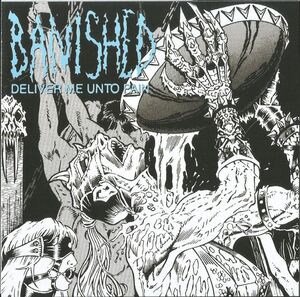
Banished - Deliver Me Unto Pain
One year after Baphomet released Deliver Me Unto Pain, they changed their name to Banished. They broke up later that same year, but before that, they recorded a full-length called Deliver Me Unto Pain. Due to various circumstances, it was not released until 1994. Peaceville Records also lost distribution rights during that time, so the album wasn't available in America for a while. It eventually got several re-releases, so it is by no means rare. And in case anyone is curious, the cover art was done by Tim Vigil, who is best known for the comic series Faust.
The production has a crunchier sound this time around. This may disappoint those who enjoyed the sound of The Dead Shall Inherit, but I don't have a problem with it. The music is a logical evolution of what they did on their first album. The lineup is unchanged. Drummer Rick Breier still plays a lot of strong mid-paced rhythms and stomping slow beats, all of which are broken up by excellent fills. He also plays more blast beats this time around. Bassist Gary Schipani has gotten even better. His riffs are thick, heavy, and elaborate. What's even better is that he is quite prominent in the mix, so you never miss a single one of his notes.
Tom Frost's growls have gotten even more vicious and diabolical. He also performs some angry hardcore inspired shouts on songs like "Cast Out the Flesh." The many riffs that guitarist Dave Craiglow plays are even better than the ones he composed one year prior. His palm-muted riffs are more menacing, his chord progressions are more nuanced, and his chugging riffs are more brutal. There are so many amazing breakdowns on here that it's hard for me to decide which one is best. They're all equally pulverizing.
The Dead Shall Inherit might be the more popular album, but I would argue that Deliver Me Unto Pain is better musically. The songwriting is more polished and the instrumental work hits a lot harder. It was re-released by Sevared Records last year, so if you're interested, then buy it from them.
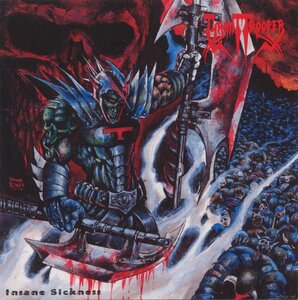
Tyrant Trooper - Insane Sickness
Tyrant Trooper was a band that always seemed to be one step behind everyone else. They formed in 1987 under the name Storm Front, but then they renamed themselves to Tyrant Trooper in 1991 to make themselves stand out more. They were playing thrash metal during a time when most such bands had either disbanded or transformed into groove metal. They then started playing a strand of early-'90s death metal during a time when the genre was splintering into brutal and technical varieties. They released just one full-length album called Insane Sickness in 1995 before splitting up sometime later. They got back together at some point in 2009, but no one has heard from them since.
Like so many other noteworthy metal albums from the period, the production quality on here has a perfect blend of clarity and heaviness. Musically, it's a mid-paced and groove-centric affair. Drummer Justin Lanteri plays galloping rhythms, skank beats, and blast beats on occasion, but he spends most of his time playing slow, simple, and hard-hitting rhythms. He also punctuates all of these different patterns with fills that manage to be quite elaborate. The best display of his skills can be found on "Unholy Incision." Jay McGuire's bass can be heard quite well, and his performance reminds me of Alex Webster's early work. What I found interesting is that Jay went on to join Otep a few years after Tyrant Trooper disbanded.
John Pucci's growls are mid-to-low-pitched. They are not as brutal as what others were doing around the same time, but they still sound great. The guitars are played by Rick Brayall and Ron Kuczuk. They plays some menacing palm-muted riffs and tremolo riffs on occasion, but for the most part they play incredibly groovy mid-paced chord progressions that are heavily inspired by hardcore. Some of these breakdowns, like the ones on "Necrolatry," border on sounding like slam. They also play much slower passages that draw influence from doom metal. They then top things off with solos that are sometimes technical and other times haunting. The most impressive one is saved for the final track.
Insane Sickness is quite simple and straightforward, but the grooves are crushing. Most modern death metal bands wish they could make material as compelling as this. As of this writing, this album has not received a re-release, which is a shame because it deserves it.
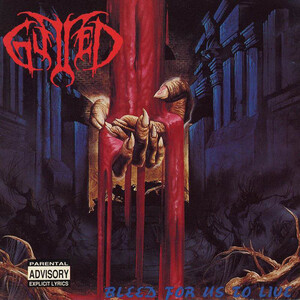
Gutted - Bleed for Us to Live
Gutted formed in Toledo, Ohio in 1990 under the name Demi-God, but then they rebranded two years later. They then put out a full-length called Bleed for Us to Live two years after that. After releasing one more album, they broke up in 1997. Other Ohioan bands such as Necrophagia and Nunslaughter overshadowed these guys, which is unfortunate because this album was great. By the way, an interesting thing to note is that the cover art was done by SV Bell, who also did the cover art for Tales from the Thousand Lakes by Amorphis.
The band takes the Obituary formula, makes it heavier, and places extra emphasis on the groove. Production duties were handled by Rob Tylak, who also produced The Last Suffer by Arius. He did a fantastic job here. All of the instruments sound heavy and can be heard well, even the bass. Bassist Mark Ditch uses that opportunity to play some delightfully grotesque and occasionally intricate riffs. This is most notable on songs like "Cold in the Coffin" and "Kickin' the Corpse." Mark also handles vocal duties. His growls sound like a deeper and more gruesome John Tardy. They're amazing, and they amplify the already menacing nature of the rest of the music.
Drummer Scott Ditch is able to play some hard-hitting blast beats, but he spends most of his time playing simple stomping rhythms that occasionally include some double bass. They're not flashy by any means, but they sound great and are played well, and that's what truly matters. The guitars are played by Michael Ditch and Billy Mills. They play some killer palm-muted riffs on occasion, but they spend most of the run time playing extremely groovy chord progressions and chugging riffs. Some of these, like those on "Skeletonized," sound strangely upbeat. A few songs, such as "Death Before Dismember," feature slower, more doom-like riffs. They also play some sweet solos, most of which are found in the last half of the album.
Bleed for Us to Live features a fantastic spin on the Obituary formula. It's heavy, groovy, and somewhat catchy at times, and they also throw in a few surprises to keep things interesting. Repulsive Echo Records re-released it a few years ago, so if you desire a physical copy, then they have you covered.